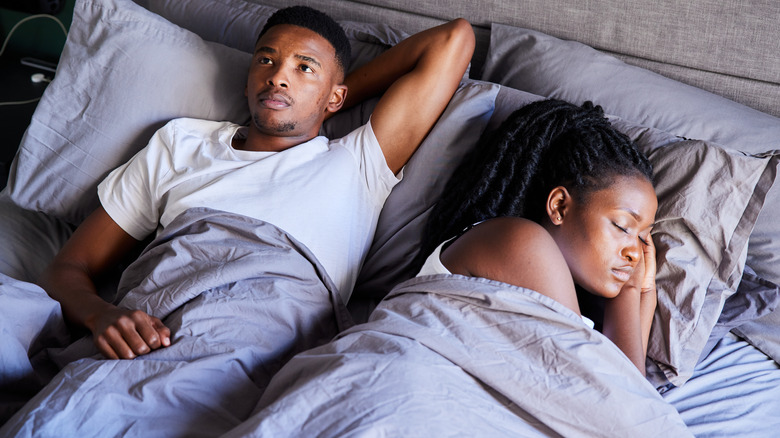Can ADHD Impact Your Sex Life? What We Know
If you have ADHD and you think it may be affecting your sex life, you could be right. The thing is, even those who have not been diagnosed with ADHD can have trouble in the bedroom, so you're absolutely not alone. Clinical psychologist Ari Tuckman told U.S. News & World Report, "Any couple can have a desire discrepancy where one wants sex more often than the other. ADHD is no different — it's just another added struggle to work on." But what are some of the struggles you may deal with when it comes to sex and ADHD?
In Tuckman's own survey done on ADHD and sex, he discovered that "people with ADHD feel a sex drive more and act on it more relative to those without ADHD." In his findings, he discovered that cisgender men with ADHD tend to have a higher sex drive than cisgender men without ADHD and cisgender women, in general. He also pointed out that cis women with ADHD will likely have a sex drive comparable to that of a cis man without ADHD. But that's just one study, and it's important to note that some people with ADHD will experience hypersexuality, while others may have hyposexuality.
Hypersexuality and ADHD
If you have a high sex drive, you have hypersexuality. Even people with ADHD can have a higher sex drive than the average person. In fact, some studies have linked a connection between ADHD and an increased sex drive. Some signs of this include being turned on often, a higher interest in things like porn and masturbation, and there's a chance that you enjoy being with multiple partners (unless you have a partner who can keep up with you). While ADHD can by all means come with a high sex drive, other things that can cause this are hormone imbalances (like high testosterone) and simply being confident in your sexuality.
Certified sex educator Cate Osborn told PsychCentral that some of the issues that can arise from hypersexuality from ADHD include impulsivity and escapism, saying "If there's a sense of outside pressures and expectations that aren't being met, meeting one's own needs by engaging in self-stimulation is a common factor in compulsive behaviors manifesting." What's most important that Osborn pointed out, though, is, "When we talk about how ADHD affects a person's sexuality, it's important to remember that we're talking about an individual."
Hyposexuality and ADHD
With that in mind, it's also important to know that some people with ADHD may experience hyposexuality. If you find little to no interest in sex, this may be the issue. While it could be an ADHD medication depleting them of their sex drive, there are other factors that can cause an aversion to both intimacy and touch, and inhibit someone from being turned on.
Stress is another factor. Jessica of JSHealth told Red, "We know that our minds and bodies must be relaxed in order to feel like sex as well as enjoy sex. So really, if you are struggling with low libido, it is not your fault." She also said, "The world we live in is enormously stressful and stress has a huge impact on people's sexual relationships and desire to have sex." An ADHD diagnosis itself can add more stress to your life, as can dealing with the sexual implications of it.
How to cope
Even if you're having sexual issues that may be affected or caused by your ADHD, there are some things you can do to help save your relationship or your sex life. Marriage consultant Melissa Orlov told PsychCentral that it's important to "Have open conversations about ADHD." Not only do you want to talk to your doctor, but also your partner. You're more likely to get a sense of understanding from them if you explain why you're feeling the way you are. Different relationships have different dynamics, and the same goes for being in a relationship with ADHD — you may get stuck in a rut where your partner feels more like a parent because you're having difficulty staying focused. You can still make the relationship work, it simply requires you both to be open with each other.
If hypersexuality is causing issues in your relationship or pushing you into risky behaviors, Orlov told PsychCentral "Unhealthy behaviors occur the most when there's inadequate support present for the person with ADHD." For someone who is single, a support system could look like your doctor, therapist, or a friend or family member who has experience with ADHD.



